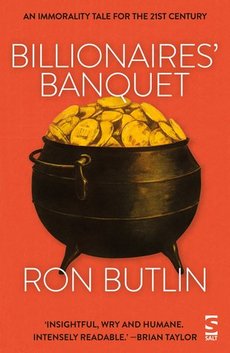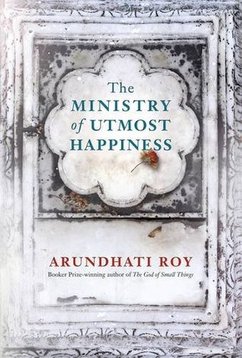Billionaires’ Banquet by Ron Butlin
Twenty years on, he’s married DD and Executive Service has given them the luxurious lifestyle they’d previously viewed only from the outside. But spiralling wealth for some means increasing destitution for others and Hume’s conscience is pricking. He’s going to rebrand his company, and separate it from the murky sideline that has supplemented its income, with a media-friendly charity dinner, at which only a fraction of those who’ve bought a £1000 ticket will be served the fine food to which they are accustomed, while the majority receive water and plain boiled rice. But with anti-capitalist protesters descending on the venue from the G8 summit a few miles down the road and Cat, on a visit from her home in Australia, as surprised as anyone to find herself among them, things might not go quite to plan.
Unaccustomed to the author’s meandering style, I wasn’t sure where this novel was going initially, if anywhere. But the lightness of touch and the themes of inequality and social justice saw me through the bumpy beginning until the shape of the story made itself known. Described by publishers, Salt, who provided my review copy, as “an immorality tale for the 21st-century”, it’s both a jolly romp and a sad indictment of the state of Britain today.
The Ministry Utmost Happiness by Arundhati Roy
The main character – or the character to whom we’re first introduced – builds a community of oddballs in a Delhi graveyard. Unlike many other hijras, Anjum was born intersex and, although brought up as a boy and choosing to live as a woman, she sees herself as containing elements of both genders. Although not a powerful position, this gives her a degree of moral authority: she is “Indo-Pak” where India and Pakistan have been at loggerheads since independence. Among her associates are a dark-skinned South Indian woman who kidnaps an abandoned baby; an architect who becomes a resistance fighter in his native Kashmir; a Hindu who takes the name Saddam Hussein after his father is murdered because of his caste.
I found the opening section, under 100 pages of traditional storytelling, the most engaging. Although I found the Kashmir-set middle interesting, there were some longeurs when the author strays from character to push a political point. The later chapters did not seem as well written and/or edited as the rest. But these criticisms should be taken in the context of an extremely proficient writer with the moral courage to wash modern India’s dirty linen in public, showing the cruelties of Hindu nationalism, slum clearance, middle-class indifference to poverty, political corruption and the caste system. Thanks to Hamish Hamilton for my review copy. For another novel about the hijra community, see The Parcel.























 RSS Feed
RSS Feed





















